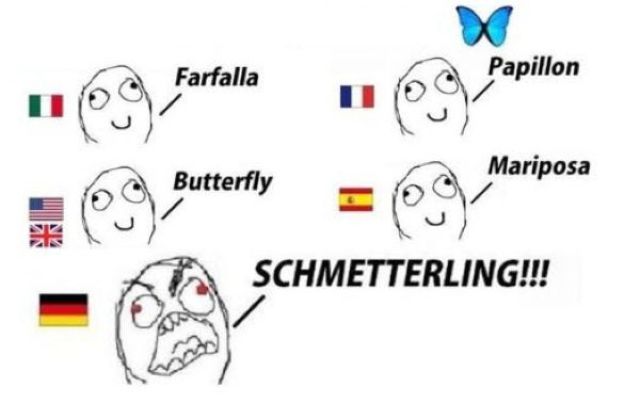1.
AMemoriam 12 year s ago
You're comparing Romance or Latin based languages with an West Germanic based language. Ofcourse it is totally different from any of these other languages x)
2.

homesanto 12 year s ago
As far as I know English is reputed to be a west Germanic language too ;) Sometimes I'm not really sure about it.
4.
ole.christensen.5203 12 year s ago
Write your comment here...
To AMemoriam, that is a very valid argument, but even compared to other germanic languages it still has words that differentiate a lot. English is also a germanic language.
To the writer of the article. Science directly translated is just Wissenschaft even though naturwissenschaft also is used
To AMemoriam, that is a very valid argument, but even compared to other germanic languages it still has words that differentiate a lot. English is also a germanic language.
To the writer of the article. Science directly translated is just Wissenschaft even though naturwissenschaft also is used
8.
homesanto 12 year s ago
"Gallinazo"? Is that really a German word? The word for hen or chicken in Spanish -and Italian- is "gallina", meaning coward or sissy too. So literally translated intro Spanish, "Gallinazo" would be "big chicken" :)
9.
loomy 12 year s ago
german: Arbeitsufahigkeitbescheidigung
slovak: peenka :)
i found always funny that germans read numbers backwards
they dont say thirty five, intead they say five and thirty :)
slovak: peenka :)
i found always funny that germans read numbers backwards
they dont say thirty five, intead they say five and thirty :)
10.
ChrisR 12 year s ago
loomy, you should check out the danish numbers! From 50 to 90 they have numbers like "four and half fifths" (which is 94; 4 + "half of the fifth score and all the scores before that half")
threes = 3 scores = 3*20 = 60
five and threes = 65 = 5 + 3 score = 5 + 3*20
half fourths = "half the fourht schore" (pluss the whole ones before it) = 3*20 + 10 = 70
The danish are the only scandinavians that use those numbers, and the rest of us struggle understanding them. At least until we learn the "key" to deciphering them.
threes = 3 scores = 3*20 = 60
five and threes = 65 = 5 + 3 score = 5 + 3*20
half fourths = "half the fourht schore" (pluss the whole ones before it) = 3*20 + 10 = 70
The danish are the only scandinavians that use those numbers, and the rest of us struggle understanding them. At least until we learn the "key" to deciphering them.
11.

homesanto 12 year s ago
Differently from other Latin languages,
French is so Baroque...
70 = 60+10 = soixante-dix
75 = 60+15 = soixante-quinze
80 = 4*20 = quatre-vingts
90 = 4*20+10 = quatre-vingt dix
95 = 4*20+15 = quatre-vingt quinze
French is so Baroque...
70 = 60+10 = soixante-dix
75 = 60+15 = soixante-quinze
80 = 4*20 = quatre-vingts
90 = 4*20+10 = quatre-vingt dix
95 = 4*20+15 = quatre-vingt quinze




To AMemoriam, that is a very valid argument, but even compared to other germanic languages it still has words that differentiate a lot. English is also a germanic language.
To the writer of the article. Science directly translated is just Wissenschaft even though naturwissenschaft also is used
English: Cool
English: Bullshit
German: gallinazo
.
slovak: peenka :)
i found always funny that germans read numbers backwards
they dont say thirty five, intead they say five and thirty :)
threes = 3 scores = 3*20 = 60
five and threes = 65 = 5 + 3 score = 5 + 3*20
half fourths = "half the fourht schore" (pluss the whole ones before it) = 3*20 + 10 = 70
The danish are the only scandinavians that use those numbers, and the rest of us struggle understanding them. At least until we learn the "key" to deciphering them.
French is so Baroque...
70 = 60+10 = soixante-dix
75 = 60+15 = soixante-quinze
80 = 4*20 = quatre-vingts
90 = 4*20+10 = quatre-vingt dix
95 = 4*20+15 = quatre-vingt quinze